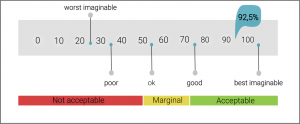Development and usability evaluation of a digital symptom tracking tool to support self-management of people with Inflammatory Bowel Disease
Aim and Research Question(s)
The aim of this master thesis was the development of a prototypical digital symptom tracking tool, to gain a deeper insight into the understanding of digital health among people with Inflammatory Bowel Disease (IBD) and its usefulness for their individual health management.
Background
IBD is a lifelong, incurable condition defined by chronic inflammation of the gastrointestinal tract. The two most common forms are Crohn's disease and ulcerative colitis [1]. In Austria around 30.000 to 50.000 people are affected [2]. In this context it was found that applications and digital health tools have the potential to improve symptom management through the concept of self-management [3].
Methods
To meet all user requirements possible, an user-centred design approach was chosen:
- To provide the background information and the current state of the art, a literature resarch and market analysis were conducted.
- In order to define the functional requirements and as a basis for the perso
 nas, an online questionnaire has been carried out.
nas, an online questionnaire has been carried out. - To get insights about the user requirements of the overall structure of the prototype an online card sorting workshop was conducted.
- Based on the previous steps, paper drawings, wireframes and a clickable prototype were developed.
- Evaluation of the prototype through individual workshops using the "thinking aloud" method.
Results and Discussion
The participant observations were positive, all participants were rather euphoric and stated that they felt valued and encouraged because there are still very few support options for individual disease management. The prototype performed well, and no major usability errors were noticed. The usability evaluation of the prototype using the System Usability Scale (SUS) resulted in a SUS score of 92.5% which can be considered above average.

This in turn confirms that the usability is above average with regard to the aspects of effectiveness, efficiency and general ease of use.
Conclusion
This prototype demonstrated a possible approach to engage individuals with IBD in the development process of a digital symptom tracking tool. In this way, it was possible to gain a deeper insight into the number of people with IBD already using digital tools to manage their condition, the functionalities users would like to see implemented in a symptom tracking tool, and the requirements they have for the overall structure of the tool.
References
- Crohn’s & Colitis Foundation (2014), https://bit.ly/39XCb9W
- Statistik Austria (2019), https://bit.ly/38fDpwu
- Majidova et al. (2021), https://bit.ly/3lFkzls